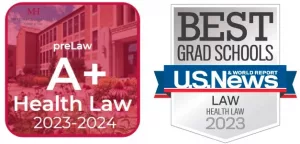 Mitchell Hamline’s Health Law Clinic
Mitchell Hamline’s Health Law Clinic
An in-depth overview with Clinic Instructor and Professor of Law Ana Pottratz Acosta
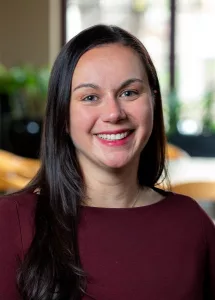 Tell us about your professional background and how it has served you as HLI’s Health Law Clinic director.
Tell us about your professional background and how it has served you as HLI’s Health Law Clinic director.
Prior to joining the MHSL faculty to teach the MHSL Health Law Clinic, I worked for 12 years as an immigration attorney. After graduating from Columbia Law School in 2004, I began my career as a staff attorney and later as a supervising attorney with the Lutheran Social Services of New York (LSSNY) Immigration Legal Services Program. In this role, I represented low-income immigrants in New York City in naturalization, family-based petitions, affirmative and defensive asylum applications and in removal proceedings before the New York Immigration Court. After moving back home to Minnesota, I worked for six years in private practice, primarily in employment-based immigration matters, including three years at the firm Stinson Leonard Street. While at Stinson Leonard Street, I also had the opportunity to supervise non-immigration attorneys at the firm on immigration pro bono matters through the Deinard Clinic, one of the oldest Medical-Legal Partnership (MLP) programs in the U.S. Both my familiarity with the MLP model used in the Health Law Clinic and my previous experience as a civil legal services lawyer were extremely helpful as I moved into my current role teaching the Health Law Clinic and overseeing the MLP program between MHSL and United Family Medicine (UFM), a Federally Qualified Health Center (FQHC) in the West 7th Neighborhood of St. Paul.
What types of cases can students expect to be involved in through the Health Law Clinic?
The Clinic is one of the course offerings that satisfies the experiential learning requirement for the Health Law and Healthcare Compliance Certificates offered by HLI. It uses an MLP model to provide legal services to patients of UFM, our medical partner. Under the MLP model, UFM patients are referred to the MLP program for legal consultations aimed at addressing a legal issue negatively impacting the patient’s health outcomes, and clinic students have the opportunity to participate in these legal screenings onsite at UFM. The MHSL Health Law Clinic also provides full representation to a portion of the cases referred by UFM providers, primarily in the areas of immigration law and Social Security disability, and students have the opportunity to represent clients in these cases as certified student attorneys working under my supervision.
Additionally, over the past two years, students in the MHSL Health Law Clinic have had the opportunity to work on community education and policy projects aimed at addressing health inequity. Examples include leading a training for physicians on best practices for completing the N-648 Disability Waiver for individuals applying for citizenship through naturalization, preparing information sheets for community members on topics related to health, and providing research assistance in support of proposed legislation addressing health inequity and social determinants of health.
Can you share an especially meaningful experience from this past academic year?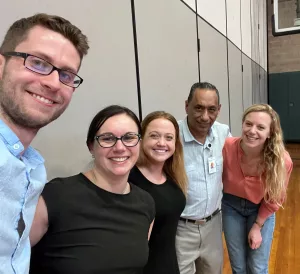
With respect to the direct services component of the clinic, we recently successfully represented a client applying for Social Security disability benefits in her hearing before a Social Security administrative Law judge based on her disabling condition of severe chronic migraine headaches that have prevented her from working for the past three years. Ahead of the hearing, Rudy Schoenecker, a 3L student assigned to work on the case, and I provided updated medical records to supplement the record, prepared a legal brief in support of the client’s Social Security disability claim and met with the client to prepare her testimony. At the hearing, which was conducted telephonically, the student had the opportunity to conduct a direct examination of the client as she provided testimony in support of her claim. Approximately six weeks after the hearing, we were thrilled to receive a decision from the judge approving the client’s claim for Social Security disability benefits. Additionally, because this particular case involved a claimant applying for benefits based on a disabling condition of migraine headaches, an “invisible illness” and a condition that disproportionately affects women, I hope to engage in scholarly research examining disparities in awarding disability benefits for claimants with migraine headache disorder, autoimmune conditions, and other invisible illnesses that disproportionately impact women.
In terms of policy work by the clinic, in the spring 2023 semester two advanced students in the clinic, Jayashree Venkateswaran ’23 and Kelsi Nusbaum ’23, and I co-authored a letter comment on behalf of the Medical-Legal coalition group, Frente Accion Latinx de Minnesota (FALM), in opposition to proposed border security and asylum regulations by the Biden administration. The letter comment, authored by the Mitchell Hamline Health Law Clinic, focused on the negative impacts the proposed rule would have on the health and safety of asylum seekers. In addition to FALM as the organization that submitted the letter comment and the Health Law Clinic as the lead author, the final letter included signatures from nearly 30 additional organizational and individual signatories.
There are some exciting plans to expand the Health Law Clinic. Can you share those with us?
Related to the policy work the students and I have engaged in through the Health Law Clinic, we are in the initial stages of expanding the clinic to create a Health Justice Clinic track, focused on policy work addressing health inequity at a systemic level. In anticipation of this proposed expansion, during the spring 2023 semester students in the Health Law Clinic completed legal research in support of proposed legislation to expand eligibility for MinnesotaCare, Minnesota’s state funded public healthcare program, to cover all low-income Minnesota residents, regardless of immigration status. This researched focused on the economic benefits of such an expansion of MinnesotaCare, including reductions in the uninsured rates in Minnesota and costs of uncompensated care. We were incredibly excited the immigrant expansion of MinnesotaCare was included in the Health and Human Services Omnibus Bill passed on the last day of the Minnesota legislative session. By expanding the Health Law Clinic to create the health justice track, we hope to engage in additional projects that will have a larger impact on eliminating structural barriers negatively impacting health.
What has been your favorite thing about leading the Health Law Clinic?
Hands down, my favorite part of teaching the Health Law Clinic is working with students. I continue to be amazed by the work they do each semester, and working with students makes me incredibly hopeful for the future of our profession.
 Health Law Clinic’s Impact on Students
Health Law Clinic’s Impact on Students
Offering hands-on learning opportunities by helping the community through a medical-legal partnership
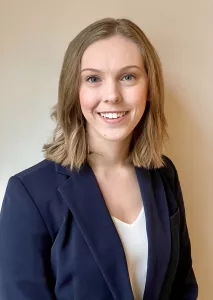 Student Spotlight — Daina Strub Kabitz, MPH and 3L
Student Spotlight — Daina Strub Kabitz, MPH and 3L
Tell us about your experiences with the Health Law Clinic and the work you’ve done for people in the community.
I’ve been very fortunate to have the opportunity to work on a variety of cases in my time with the Health Law Clinic. This allowed me to gain exposure to many different facets of immigration law—immigration status is certainly a social determinant of health—from adjustment of status applications and asylum petitions to the intersection of criminal law and immigration proceedings. My caseload has also given me the opportunity to work with a variety of clients. This is something that a doctrinal class simply cannot teach you. Each client brings something different to the table, and learning how to collaborate effectively with each client, irrespective of any individualized barriers, to provide them quality legal services is a skill that I am privileged to have been able to grow in the clinic.
On top of the clinic’s client-centered work, it is a community asset. Working in the Health Law Clinic has given me the opportunity to flex legal advocacy skills, and to develop resources that have value beyond the nuances of a specific case. I’ve had the opportunity to table at community events and to participate in walk-up legal screenings. Working in the clinic has shown me firsthand that the first step in increasing access to justice is willingness to engage and spend time in communities for whom the legal system was not designed.
How has your experience as a law student been affected by your participation in the Health Law Institute and Clinic?
The Health Law Clinic has really positively impacted my law school experience. As I alluded to above, I believe that experiential learning is key to maximizing learning in law school and the clinic has been a key experience for me. Additionally, the medical-legal partnership model that the clinic uses has allowed me to leverage both the legal education I’m gaining and my master’s degree in public health. In fact, the type of work the clinic does and the issues it focuses on are exactly what motivated me to come to law school in the first place. Working in the clinic has been an affirmative experience and has demonstrated to me what a career that walks the line of both my interests could look like.
What has been your favorite experience in law school so far?
I’m beginning to sound like a broken record here, but I really value the experiential learning that I have been able to pursue while in school—the clinic has been central in this regard. Being able to continue in the clinic for multiple semesters has allowed me to see cases through several stages and has permitted me to develop meaningful relationships with Professor Acosta, the adjunct professors, and my fellow students. I really can’t recommend taking a clinic enough; it’s a great way to gain real-world experience, develop your network at Mitchell Hamline, and balance the rest of your studies. On top of the Health Law Clinic, I’ve really enjoyed my work with Mitchell Hamline’s Self-Help Clinic and with the Public Health Law Center.
Student Spotlight —William Wilkowske, 3L
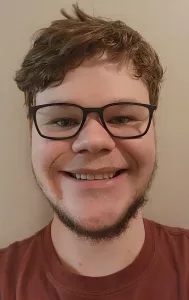
Through the Health Law Clinic, I have worked on addressing the social determinants of health that often have negative repercussions for those seeking health care. As such, I have had the opportunity to work on a variety of topics, including family law, immigration law, community outreach, and developing community resources. My law school experience has been greatly enriched by my participation in the Health Law Clinic. It has provided me with a really unique opportunity to help those in need while also being able to learn from the clinic faculty. I would have to say that working in the Health Law Clinic has been my favorite experience in law school. I would highly recommend clinical work to any student looking to develop practical skills while also exploring areas of law that they might be interested in.
 Mitchell Hamline’s Health Law Institute
Mitchell Hamline’s Health Law Institute
Giving students a competitive edge through a comprehensive approach
Food Law Center: The center is hosting a virtual symposium on January 25th, 2024, from 9 am-12:30 pm CT. This CLE event is a timely overview of food related topics, including recent FDA rules and guidance, anti-trust, the proposed Farm Bill, and labeling litigation from plaintiff and defendant perspectives. Save the date and visit the center’s page for more information.
Certificate Specializations: Our Health Law and Health Care Compliance Certificates offer students a specialized and customized curriculum to help them achieve their goals and aspirations and enter the market with a competitive edge. The Health Care Compliance Certificate is one of only a few in the country to be accredited by the Compliance Certification Board (CCB).
National Writing Competition: We host the Roy Snell Health Care Regulatory and Compliance Writing Competition every spring. This rigorous competition requires students to analyze a hypothetical fact pattern involving an organization facing multifaceted legal challenges and recognizes law students for innovative, strategic, and sound approaches to tackling complex contemporary health care regulatory and compliance issues. Registration is open until January 31, 2024!
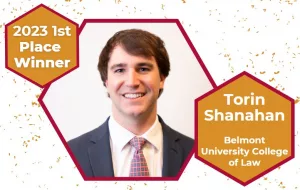
“I absolutely recommend this competition to all law students interested in healthcare or transactional law. It offers a challenging and unique experience that is rare to find in typical law school courses.”
– Torin Shanahan


